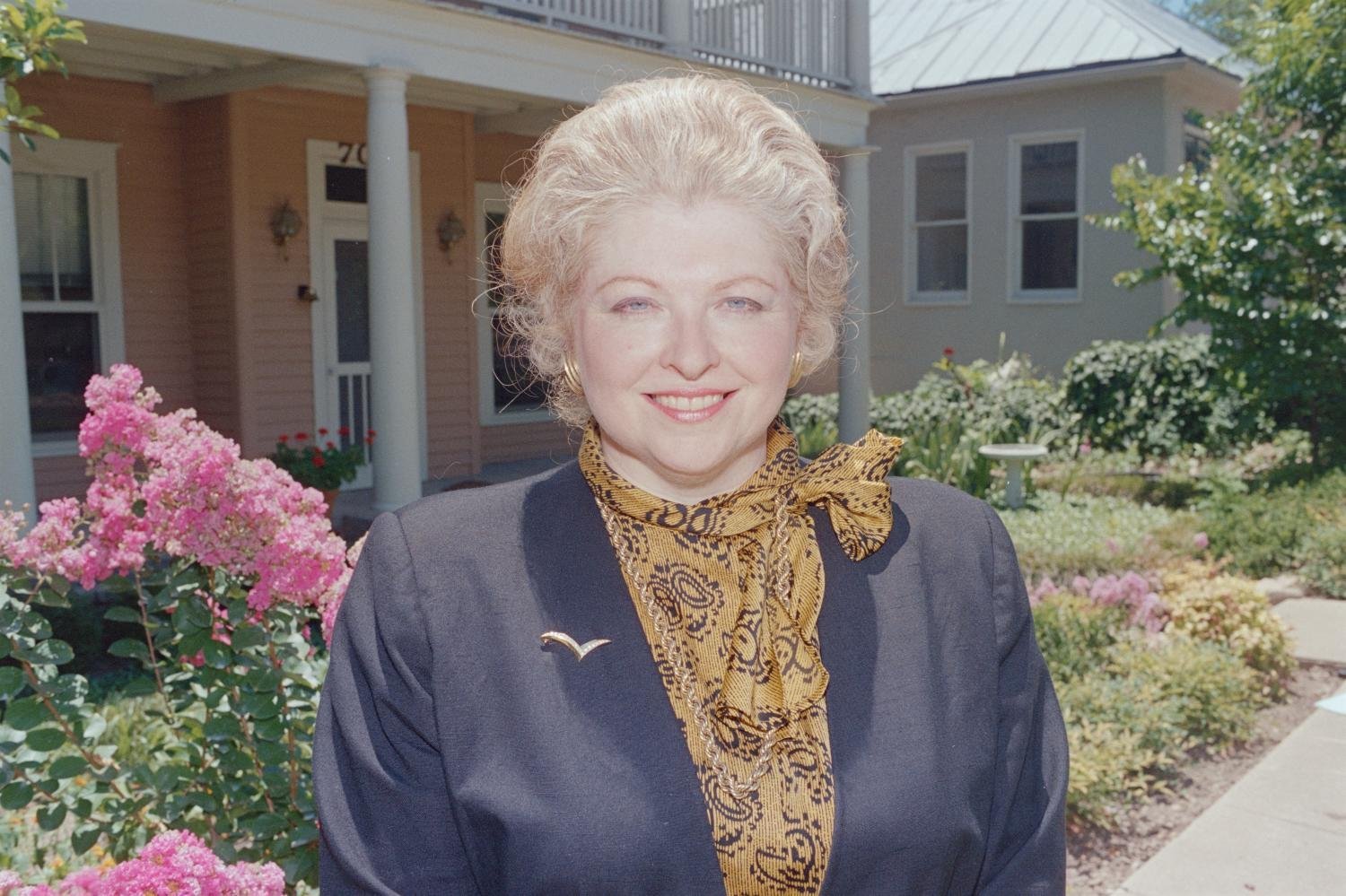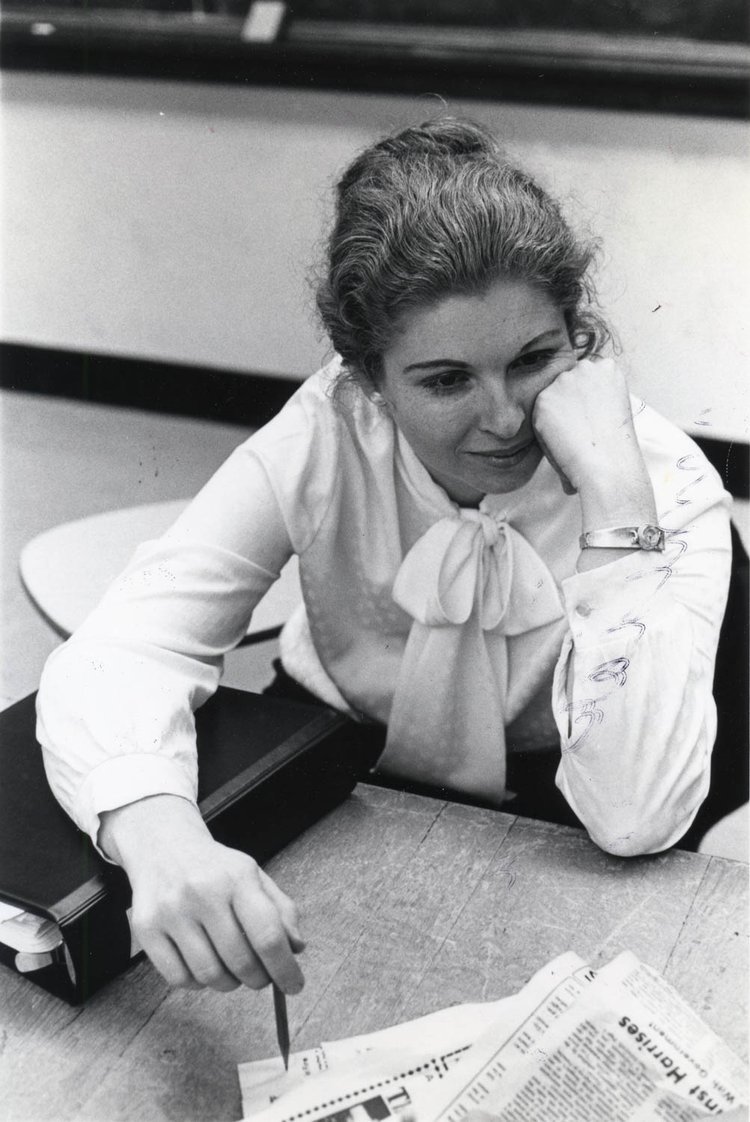A Woman's Place: Sarah Weddington & the Fight for Roe v. Wade
Weddington standing outside her longtime home and law office at 709 W 14th Street (Davis, Lisa. [Sarah Weddington Standing Outside], photograph, Date Unknown; Austin History Center via The Portal to Texas History)
A quaint yellow building is nestled on West 14th Street, located less than half a mile west of the Texas State Capitol in downtown Austin. Passersby would have no way of knowing that over 50 years ago this unassuming spot was where a young UT Law graduate prepared for a case that would change the course of U.S. history. In 1973, Sarah Weddington successfully argued the landmark Roe v. Wade case to the Supreme Court that established a constitutional right to abortion. As a result, the decision expanded women's access to a fuller experience of citizenship, and the fabric of American life was irrevocably altered.
Weddington was born to Abilene, TX residents Reverend Herbert and Lena Ragle in 1945. She majored in English at McMurry College before pursuing law at the University of Texas at Austin. She completed her law degree in 1967, one of only five women in her graduating class. After finishing school, Weddington experienced discrimination when interviewing for legal jobs. She recalled that during one of her interviews she was told that “young lawyers often have to work late, and you would need to be home cooking supper for [her] husband.” (“Sarah Weddington Runs for Legislature by Carolyn Cates Wylie accessed at the Austin History Center, April 1970). Her husband, James “Ron” Weddington, was a fellow UT Law graduate. By 1969 they would buy the West 14th property and set up their joint law office on the first floor while living on the second story.
Business card for Ron and Sarah Weddington’s practice located at their home on W 14th Street (Accessed at the Austin History Center)
In Texas in the 1960s there were not many options available to women to prevent unwanted pregnancies. Birth control was only available to married women or women that were within six weeks of their wedding, and abortions were a felony except when necessary to save the pregnant woman’s life. At the University of Texas at Austin, a small group of female activists started to operate an underground birth control and pregnancy counseling center to connect women with resources to prevent pregnancy. Sometimes the activists would refer, or even accompany, pregnant women to doctors that were willing to perform an abortion in other states or Mexico. The activists wondered whether they could be legally culpable for the assistance they provided, so they reached out to Weddington, who was a friend of some of the women involved, to get advice.
Weddington circa 1970 (PICB-11116 - Austin History Center)
Weddington admitted that she wasn’t sure whether or not they could be prosecuted, so as she began her research she talked the matter over with fellow UT Law graduate Linda Coffee. As the two women discussed the abortion laws in Texas one thing became clear–there seemed to be a good chance that they could take down the legislation altogether on the grounds of privacy.
In fact, Coffee shared that she was already working on the aboriton issue in Dallas. She was in the midst of preparing to file a suit on behalf of the pregnant Norma McCorvey–or as she would soon be known across the country, Jane Roe. Coffee asked Weddington if she would be willing to be co-counsel on the case challenging the abortion law in Texas. Weddington accepted, and because of her strong skills as an orator would eventually be the main figure associated with the Roe v. Wade case in most people’s minds. The women prepared their case in the following months, and soon filed what would become one of the most well known legal cases in the history of the United States.
After a unanimous decision in favor of Weddington and Coffee at the District Court level in 1970, the case went before the Supreme Court in 1971. Although Coffee and Weddington both made oral arguments at the district-level, they decided it would be better if just Weddington, who had taken more of a shine to the spotlight, made the oral arguments before the Supreme Court alone.
Weddington recalled spending hours crafting her arguments in her home and office on West 14th. At the time she was only 26 years old and due to her difficulty obtaining a job out of school largely inexperienced. In fact, before Roe v. Wade she had only handled simple legal matters such as uncontested divorces and straightforward wills. Despite her lack of experience, Weddington skillfully argued her and Coffee’s case before the Supreme Court in 1971. The landmark decision that made abortion legal in Texas and the rest of the country was announced in January of 1973.
Promotional materials for Weddington’s first campaign for the Texas House of Representatives. (Accessed at the Austin History Center)
Prior to the Supreme Court decision’s announcement of her victory in Roe v. Wade, Weddington decided to run for the Texas House of Representatives. During this time her West 14th home served as a political campaign headquarters. She was elected as a State Representative in 1972, then again in 1974 and 1976. During her time as a Representative she worked on women’s issues such as extending the statute of limitation for reporting rape in Texas. Following her career in the Texas House, Weddington was appointed as general counsel for the Department of Agriculture in 1977, was an assistant to President Jimmy Carter on women’s rights issues from 1978-1981, and from 1983-1985 served as the director of the Texas Office of State-Federal Relations. She also lectured at both Texas Woman’s University and the University of Texas at Austin in her later years. Weddington passed away at her Austin home in 2021. Weddington remained a strong advocate for women’s rights throughout her career.
PICB-09594 - Austin History Center
There is an urgent need to preserve women’s heritage, not only because women deserve the historical presence that is owed them. For decades, traditional preservation has failed to recognize and protect these spaces, and their stories have been overlooked or deliberately obscured. Women are not alone in this––the places and histories of people of color, the LGBTQ community, the disabled, and the working class have also been largely ignored. Spaces where marginalized groups can gather and organize are spaces of political potential. Sarah Weddington’s office on West 14th Street was the site of many long hours and late nights as she and her fellow advocates strategized to argue this landmark case. When met with moments of political weariness, historic preservation is uniquely positioned to convey these spaces not merely as artifacts of an era now passed, but as repositories of renewed possibility that can be harnessed.
As Roe v. Wade continues to make headlines more than 50 years after the landmark decision, it is more important than ever to remember Austin’s part in the story. Although today the dome of the Capitol signifies for some that the fight for women’s rights is far from over, it is important to remember that less than half a mile away this unassuming yellow house on W 14th has stood the test of time as well.
709 W 14th Street as it stands today
-
Bell, Joseph N. “A Landmark Decision.” Good Housekeeping: 77-79; 148-152. N.d. Accessed at the Austin History Center.
Dudley, Mary. “The Odyssey of Sarah Weddington.” Texas Women: 24- 28. November 1979. Accessed at the Austin History Center.
Duke, Diana. “Political Person: Wedington Still Seeks to Lead, But Not in Office.” Austin Business Journal. September 26, 1988. Accessed at the Austin History Center.
Griess, Rachel. “Fight Like a Girl: Preserving Feminist History in Austin, Texas.” Ms. August 17, 2018. https://msmagazine.com/2018/08/17/fight-like-girl-preserving-feminist-history-austin-texas/
Hall, Cheryl. “Weddington’s Idealism Still Burns Brightly.” n.d. Accessed at the Austin History Center.
James, Crispin. “Abortion Laws to be Re-Argued Wednesday.” Austin American Statesman October 8, 1972. Accessed at the Austin History Center.
Seelye, Katharine Q. “Sarah Weddington, Who Successfully Argued Roe v. Wade, Dies at 76.” New York Times. December 27, 2021. https://www.nytimes.com/2021/12/27/us/politics/sarah-weddington-dead.html
Smith, Alison. “Texas Aborition Law Struck Down: State Rep. Weddington Wins Case Before Supreme Court.” The Daily Texan. January 23, 1973. Accessed at the Austin History Center.
The Texas Observer. “This Right of Privacy.” February 16, 1973. Accessed at the Austin History Center.
Weddington, Sarah. “Court Abortion Victory Not Enough.” The Daily Texan. February 1, 1973. Accessed at the Austin History Center.
Wylie, Carolyn C. “Sarah Weddington Runs for Legislature.” April 1970. Accessed at the Austin History Center.
PRESERVATION AUSTIN IS INDEBTED TO THE FOWLER FAMILY FOUNDATION FOR MAKING THIS RESEARCH POSSIBLE.







